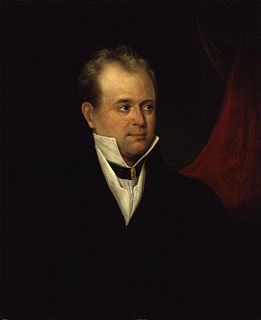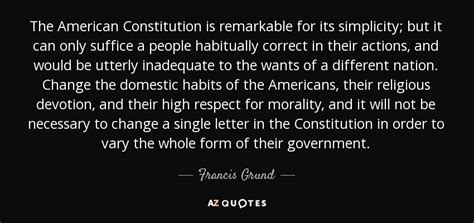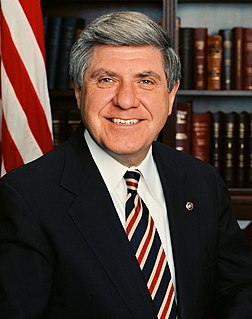A Quote by Richard Carlile
Free discussion is the only necessary Constitution - the only necessary Law of the Constitution.
Quote Topics
Related Quotes
People must be confident that a judge's decisions are determined by the law and only the law. He must be faithful to the Constitution and statutes passed by Congress. Fidelity to the Constitution and the law has been the cornerstone of my life and the hallmark of the kind of judge I have tried to be.
The American Constitution is remarkable for its simplicity; but it can only suffice a people habitually correct in their actions, and would be utterly inadequate to the wants of a different nation. Change the domestic habits of the Americans, their religious devotion, and their high respect for morality, and it will not be necessary to change a single letter in the Constitution in order to vary the whole form of their government.
In a very real sense, the Constitution is our compact with history . . . [but] the Constitution can maintain that compact and serve as the lodestar of our political system only if its terms are binding on us. To the extent we depart from the document's language and rely instead on generalities that we see written between the lines, we rob the Constitution of its binding force and give free reign to the fashions and passions of the day.
Lawyers are necessary in a community. Some of you...take a different view; but as I am a member of that legal profession, or was at one time, and have only lost standing in it to become a politician, I still retain the pride of the profession. And I still insist that it is the law and the lawyer that make popular government under a written constitution and written statutes possible.
Are we reading the Constitution and pondering it? Are we aware of its principles? Are we abiding by these principles and teaching them to others? Could we defend the Constitution? Can we recognize when a law is constitutionally unsound? Do we know what the prophets have said about the Constitution and the threats to it?
If colleges wanted to admit only legacies, or only tuba players, or only people who got astonishingly low SAT scores ' to ensure some of their graduates would be U.S. senators one day ' the Constitution wouldn't stop them. What the states, including state colleges, cannot do under the Constitution is discriminate on the basis of race.
I often wonder whether we do not rest our hopes too much upon constitutions, upon law and upon courts. These are false hopes, believe me, these are false hopes. Liberty lies in the hearts of men and women; when it dies there, no constitution, no law, no court can save it; no constitution, no law, no court can even do much to help it. While it lies there it needs no constitution, no law, no courts to save it.
































